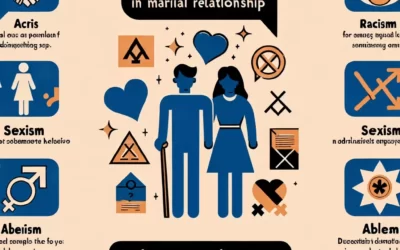Discriminatory Abuse
What Is Discriminatory Abuse In The Context Of Marriage?
Imagine a world where marriage is viewed as an equal partnership built on love, respect, and...
How Can I Regain My Self-esteem After Being Subjected To Discriminatory Abuse?
Imagine feeling the weight of discriminatory abuse, an experience that can leave you feeling...
How Do I Recognize Discriminatory Abuse From My Spouse?
Imagine feeling trapped in a relationship where you are constantly belittled, controlled, and...
What Is Discriminatory Abuse In The Context Of Marriage?
Find out what discriminatory abuse in the context of marriage is, its different forms, and the effects it has on individuals and relationships. Learn about recognizing and addressing this abuse, legal perspectives, psychological dynamics, socio-cultural factors, and available support services.
How Can I Regain My Self-esteem After Being Subjected To Discriminatory Abuse?
Discover the path to regaining self-esteem after experiencing discriminatory abuse. Understand its impact, seek support, and cultivate self-compassion. Find empowerment and reclaim your strength.
How Do I Recognize Discriminatory Abuse From My Spouse?
Discover how to recognize discriminatory abuse from your spouse. Learn the signs, seek support, and protect yourself. Read on for clarity and healing.
Discriminatory abuse revolves around prejudiced attitudes or behaviors towards individuals based on their personal characteristics or group affiliations.
Racial and Ethnic Discrimination: Biased treatment based on someone’s race or ethnicity.
Sexual Discrimination: Prejudiced behaviors or attitudes based on someone’s gender or sex.
Ageism: Discrimination targeted towards individuals based on their age.
Religious Discrimination: Biased treatment due to someone’s religious beliefs or practices.
Disability Discrimination: Prejudiced attitudes or behaviors against those with disabilities.
Xenophobia: Discrimination against people from different countries or cultural backgrounds.
Sizeism and Body Shaming: Discrimination based on a person’s body size or shape.
Classism: Discrimination based on socio-economic status or class.
Language Discrimination: Prejudice against individuals based on their language or accent.
Educational Discrimination: Bias based on a person’s level of education or educational institution.
Health Status Discrimination: Discrimination against individuals based on health conditions, including HIV status.
Occupational Discrimination: Bias towards individuals based on their job or profession.
Nativism: Discrimination against non-native individuals or groups.
Housing Discrimination: Prejudiced practices that prevent certain individuals from renting or buying homes.
Employment Discrimination: Unfair treatment in the workplace based on non-work-related characteristics.
Criminal Record Discrimination: Bias against individuals due to past criminal records.
Refugee and Migrant Discrimination: Discrimination against those who have migrated or sought refuge.
Caste Discrimination: Prejudice based on the hierarchical caste systems in some societies.
Cyber Discrimination: Online platforms and digital spaces where discriminatory abuse can occur.
Stereotyping: Overgeneralized beliefs about particular groups leading to biased behavior.
Intersectional Discrimination: Overlapping and interdependent systems of discrimination or disadvantage.
Cultural Appropriation: Adopting elements of one culture by members of another culture, often stripping them of their original meaning.
Institutional Discrimination: Discriminatory treatment, unfair policies, or biased practices within institutions.
Exclusionary Practices: Deliberate actions that exclude specific groups or individuals from particular activities or rights.
Awareness, education, and understanding are essential in addressing and reducing discriminatory abuse. It’s crucial to promote inclusive values and stand up against prejudices.


